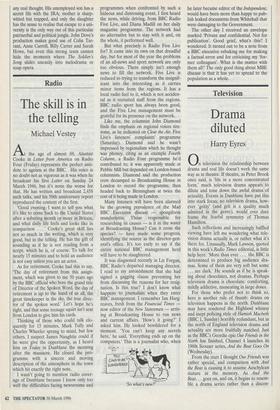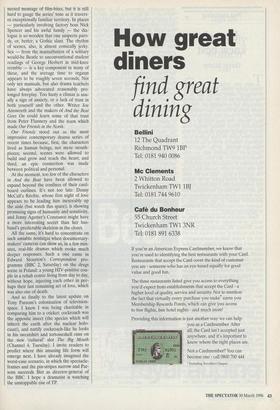Television
Drama diluted
Harry Eyres
On television the relationship between drama and real life doesn't work the same way as in theatre. If theatre, as Peter Brook once said, is 'life in a more concentrated form,' much television drama appears to dilute and tone down the awful drama of actuality. Events in Dunblane have put this into stark focus; no television drama, how- ever 'gritty' (and grit is a quality much admired in the genre), would ever dare frame the fearful symmetry of Thomas Hamilton.
Such reflections and increasingly baffled viewing have left me wondering what tele- vision drama actually is, or rather what it's there for. Unusually, Mark Lawson, quoted in this week's Radio Times editorial, is little help here: 'More than ever. . . the BBC is determined to produce big audience dra- mas. Some of them are very soft but some . . . are dark.' He sounds as if he is speak- ing about chocolates, not dramas. Perhaps television drama is chocolate: comforting, mildly addictive, nauseating in large doses.
For those who prefer not to think so, here is another rule of thumb: drama on television happens in the north. Dunblane may have rendered the Highland whimsy and inept policing style of Hamish Macbeth (BBC 1, Sunday) horribly redundant, but in the north of England television drama and actuality are more fruitfully matched. Just as the BBC's Geordie epic Our Friends in the North has finished, Channel 4 launches its 1960s Scouser series, And the Beat Goes On (Wednesday).
From the start I thought Our Friends was rather special, and comparison with And the Beat is causing it to assume Aeschylean stature in the memory. As And the Beat. . . goes on, and on, it begins to resem- ble a drama series rather than a discon- nected montage of film-bites, but it is still hard to gauge the series' tone as it travers- es exceptionally familiar territory. In places — particularly involving factory boss Nick Spencer and his awful family — the dia- logue is so wooden that one suspects paro- dy, or, better, a Gothic slant. The rhythm of scenes, also, is almost comically jerky. Sex — from the masturbation of a solitary would-be Beatle to unconventional student readings of George Herbert in mid-knee tremble — is a key component in many of these, and the average time to orgasm appears to be roughly seven seconds. Not only sex manuals, but also drama teachers have always advocated reasonably pro- longed foreplay. Too hasty a climax is usu- ally a sign of anxiety, or a lack of trust in both yourself and the other. Writer Joe Ainsworth and the makers of And the Beat Goes On could learn some of that trust from Peter Flannery and the team which made Our Friends in the North.
Our Friends stood out as the most impressive contemporary drama series of recent times because, first, the characters lived as human beings, not mere mouth- pieces; second, scenes were allowed to build and grow and reach the heart; and third, an epic connection was made between political and personal.
At the moment, too few of the characters in And the Beat have been allowed to expand beyond the confines of their card- board outlines. It's not too late: Danny McCall's Ritchie, whose first night of love appears to be leading him inexorably up the aisle (but watch this space), is showing promising signs of humanity and sensitivity, and Jenny Agutter's Constance might have a more interesting secret than her hus- band's predictable skeleton in the closet.
All the same, it's hard to concentrate on such amiable nostalgia when documentary- makers' cameras can show us, in a few min- utes, real-life dramas which evoke much deeper responses. Such a one came in Edward Stourton's Correspondent pro- gramme (BBC 2, Saturday) on the drugs scene in Poland: a young HIV-positive cou- ple in a rehab centre living from day to day, without hope, injecting each other in per- haps their last remaining act of love, which was also one of death.
And so finally to the latest update on Tony Parsons's colonisation of television- space. I knew I was being charitable in comparing him to a cricket: cockroach was the apposite insect (the species which will inherit the earth after the nuclear holo- caust), and nattily cockroach-like he looks in his sweatshirt and tortoiseshell rims on the new 'cultural' slot The Big Mouth (Channel 4, Tuesday). I invite readers to predict where this amazing life form will emerge next. I have already imagined the worst-case scenario, in which the spectacle- frames and the pin-stripes narrow and Par- sons succeeds Birt as director-general of the BBC. I hope a dramatist is watching the unstoppable rise of TP.



























































 Previous page
Previous page